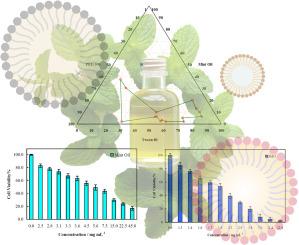Development of a self-nanoemulsifying system for the oil extract of Mentha spicata L. and evaluation of its anticancer efficacy in vitro
IF 5.1
Q1 CHEMISTRY, APPLIED
引用次数: 0
Abstract
Nanocarriers based on (natural) lipids have been extensively studied to improve the oral bioavailability of anticancer compounds/drugs with poor water solubility. Self-nanoemulsifying drug delivery systems (SNEDDSs) are a route to improve the solubility and bioavailability of lipophilic compounds. In a present study, an SNEDDS using the oil extract of Mentha spicata L. leaves, Tween 80, and PEG 600 (SMO) was prepared. Pseudo-ternary phase diagrams were constructed to find suitable surfactant, solubilizer with the oil extract that form self-nanoemulsion after dilution in water. SMO comprised Tween 80:PEG 600:the oil with 2:3:5 in volume ratios or 2.1:3.4:4.5 in mass ratios. It comprised nanodroplets of 82.5 ± 4.7 nm in diameter and had a stability of >45 days. SMO led to enhanced cytotoxicity of the oil extract with IC-50 values of 1.9 ± 0.1 and 2.0 ± 0.1 mg mL−1 for MDA-MB-231 and MCF-7 cells, respectively. SMO would be applicable for delivery of either water insoluble chemotherapeutic drugs or natural anticancer oils upon more investigations.

薄荷油提取物自纳米乳化体系的建立及其体外抗癌效果评价
基于(天然)脂质的纳米载体已被广泛研究,以提高水溶性差的抗癌化合物/药物的口服生物利用度。自纳米乳化给药系统(snedds)是提高亲脂性化合物的溶解度和生物利用度的途径。本研究以薄荷叶油提取物、Tween 80和PEG 600 (SMO)为原料制备了SNEDDS。构建拟三元相图,寻找合适的表面活性剂、增溶剂和油提取物在水中稀释后形成自纳米乳。SMO由Tween 80: peg600:体积比为2:3:5或质量比为2.1:3.4:4.5的油组成。它由直径为82.5±4.7 nm的纳米液滴组成,稳定性为45天。SMO对MDA-MB-231和MCF-7细胞的IC-50值分别为1.9±0.1和2.0±0.1 mg mL−1,从而增强了油提取物的细胞毒性。在更多的研究中,SMO将适用于水不溶性化疗药物或天然抗癌油的输送。
本文章由计算机程序翻译,如有差异,请以英文原文为准。
求助全文
约1分钟内获得全文
求助全文

 求助内容:
求助内容: 应助结果提醒方式:
应助结果提醒方式:


